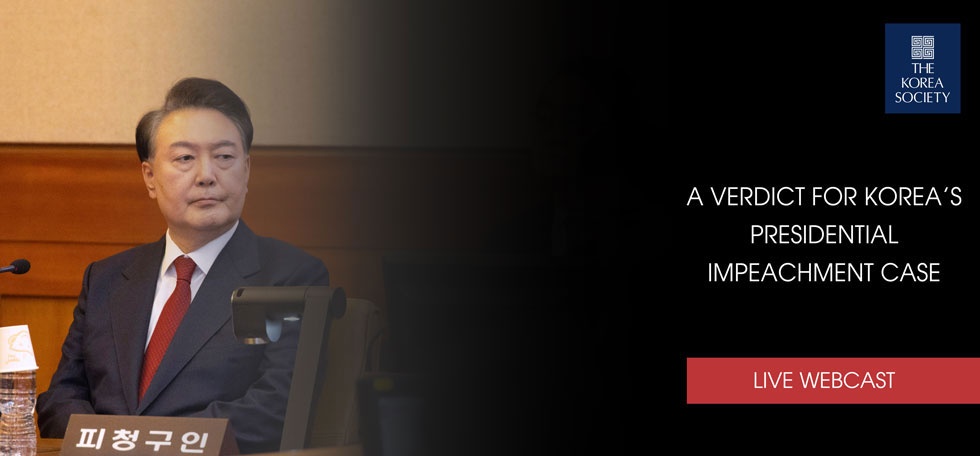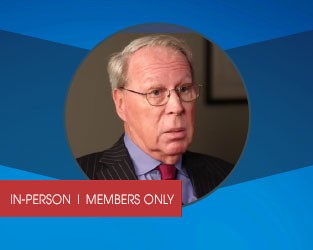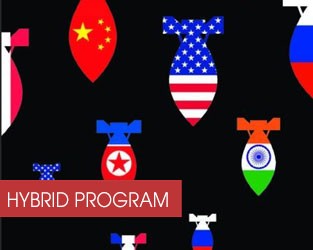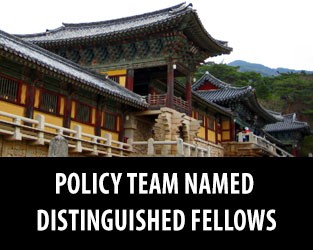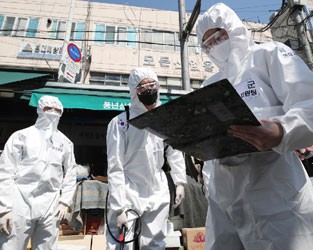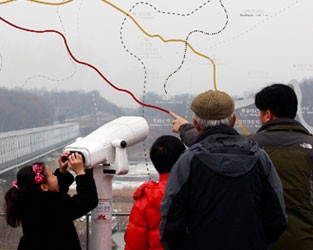Northeast Asia Regional Review
with
Donald S. Zagoria, Senior Vice President, National Committee on American Foreign Policy
Evans Revere, Senior Fellow, Brookings Institution
Ambassador Winston Lord, Co-chairman, International Rescue Committee
Ambassador Mark Minton, President, The Korea Society (Moderator)
AMBASSADOR MINTON: (Moderator)
Good morning everyone, and welcome to The Korea Society. I'm President Mark Minton. On May 16, the National Committee on American Foreign Policy and The Korea Society jointly sponsored a quadrilateral meeting of distinguished academics and former government officials from the United States, China, the Republic of Korea and Japan. I believe that was an especially fruitful session. We discussed many of the problems in Northeast Asia and also the relationship between and among the countries involved. For us, at least, it was a suitable introduction to the rather rapid pace of high-level diplomacy that has subsequently taken place. Just a short time ago we had a Republic of Korea-United States summit in Washington, D.C. Madam Park Geun-hye, the President of the Republic of Korea, had her first meeting with President Obama. Shortly after that was the China-U.S. summit in California. On the 27th of this month will be the Republic of Korea-China summit in Beijing.
I'm sure all of you in this distinguished audience were hopeful, as we were, that there would be a North-South Korean engagement last week to try to repair a very frayed relationship. If this had taken place, it would have been the first meaningful, high-level interaction of cabinet ministers between North and South Korea in six years. Unfortunately, but not surprisingly, that meeting did not take place. It was canceled because of a disagreement over protocol. Regardless, all of these events have made this an especially fruitful time to take a closer look at relationships in Northeast Asia and some of the issues that the participant countries and international community are attempting to resolve.
We have gathered together today a distinguished panel to discuss some of these issues. Ambassador Winston Lord needs no introduction. He is a former ambassador to China, former director of the policy planning staff at the State Department, former assistant secretary of state for East Asian Pacific Affairs, and accompanied Nixon and Kissinger to China. Ambassador Lord will focus on the recent China-U.S. summit. Dr. Donald S. Zagoria, senior vice president of the National Committee on American Foreign Policy, is a frequent contributor to our programs here at The Korea Society and a most distinguished East Asian specialist. He's taught at Hunter College and Columbia University, along with being a consultant to the National Security Council and State Department on Northeast Asian issues. Finally, we have an old friend, Evans Revere. Evans had a long and distinguished diplomatic career which focused on China, Japan and Korea. He's former director of the Office of Korean Affairs in the State Department, former principal deputy assistant secretary for East Asia and was also, for quite some time, acting assistant secretary of state for East Asian and Pacific Affairs. He is currently a senior director with the Albright Stonebridge Group in Washington. He served prior as president of The Korea Society.
I would like to start by asking Dr. Zagoria to provide a regional overview based on these recent high-level meetings--a very productive Track II quadrilateral meeting.
DONALD ZAGORIA:
I would like to take this opportunity to thank The Korea Society for co-hosting that meeting along with today. Now, we have arranged this meeting in such a way that my two colleagues, Win Lord and Evans Revere, will be doing the difficult work. The two biggest problems in Asian security today have to do with the rise of China and North Korea. I will begin with a regional overview.
Madam Park, the new President of South Korea, has aptly characterized the present regional situation in East Asia as the "Asian Paradox." My understanding is that while visiting the White House, she lectured to President Obama for some time on the nature of this paradox. That paradox represents the fact that we're talking about a region that is booming economically. We have the first, second and third largest economies in the world (the United States, China and Japan), along with South Korea (now the fifteenth largest economy in the world), in addition to several emerging new powers (such as Indonesia, India, and several countries in Southeast Asia). This has generated an extraordinarily dynamic economic situation. That's the good news—the booming economies. The bad news (and this is the other side of the paradox) is the geopolitical tensions in the region. I'll just take a moment to enumerate those as they're very numerous and very worrisome.
First there is the inevitable friction between the rising power China and the dominant power the United States—what Graham Allison of Harvard has called the "Thucydides Trap.” The Thucydides Trap (all of you historians will understand immediately) has to do with the origins of the Peloponnesian War and the explanation by Thucydides that the war was largely caused by the rise of Sparta and the fear this caused in Athens at the time.
Accompanying this structural problem in U.S.-China relations are specific issues that I'm sure Ambassador Lord will go into, including the recent cyber attack issue along with a host of economic issues. Taiwan remains an issue. North Korea remains an issue. That is number one—what might be called the strategic drift that many people worry about when it comes to U.S.-China relations. Hopefully the recent summit has set in motion a process to address that.
The second major source of tension in the region is North Korea, which I'm sure Evans will tell, you in great detail, is determined to remain an unrestrained nuclear power, developing both nuclear weapons and missiles to carry them. In addition, North Korea has recently stated it is no longer interested in denuclearization and no longer even accepts the principle of denuclearization that it agreed to in earlier meetings in 2005 and 2007. This declaration has the potential to not just threaten North Korea's neighbors, but also to disrupt the entire anti-proliferation regime that has so carefully been crafted by us in recent years.
The third problem is the lingering tension between Japan and South Korea. Territorial issues and different historical factors have been a source of particular concern to the United States, because those two countries are our allies and we would like to see greater trilateral security cooperation. That remains on hold as long as these tensions persist.
Fourth are territorial and maritime issues in the South China and East China seas that involve both China and Japan. This is one set of frictions. China and several Southeast Asian countries (Vietnam and the Philippines particularly) is another set of frictions. Then there is what many have come to call an "assertive China," determined to protect what it refers to as its "core interests." I would add to this list an absence of any formal regional security architectures (such as NATO in Europe) plus growing nationalisms throughout the region.
This is a very dangerous and volatile mix. Those of us with a sense of history point to the fact that we don't want to see Asia repeat the experience of twentieth century Europe—when a combination of power rivalries, rival nationalisms and territorial disputes led to two disruptive world wars. We're still living with the consequences of that.
I have a long list here about how to resolve the paradox, but let me make a couple of very quick points. First, there is a real success story in Asia, and that's the Taiwan-China relationship. If we were convening this meeting ten or fifteen years ago, Taiwan would have been one of the top flash points in the region. How was that worked out?
To put it shortly and sweetly, there was a political accommodation between pragmatic leaders on the mainland and in Taiwan (and particularly since Ma Ying-jeou was elected president in 2008). These leaders were determined to bridge the gap between them. Many of the most fundamental problems are still there, but they have managed to ease tensions significantly: signing sixteen agreements, including an economic agreement. This is the type of political accommodation process I urge the United States, China, Japan, Korea and the rest of Southeast Asia to address.
MARK MINTON:
Thank you, Dr. Zagoria. Ambassador Lord?
AMBASSADOR LORD:
I can sum up the U.S-China summit with a historical anecdote. During the mid-1970s, Dr. Kissinger met with Zhou Enlai (I was at that meeting). Kissinger asked Zhou Enlai how he would describe the impact of the French Revolution, and he responded that it was too soon to tell. Now, if we can't understand the impact of the French Revolution after 200 years, it would be hard to understand the impact of a summit held only two weeks ago. That is my basic point and I could stop right here.
It is, in fact, too early to tell. We'll have to see how relations unfold over the coming months and years, beginning this July with strategic and economic dialogues. Officials on both sides are spinning the summit outcome, and I think we should guard against either euphoria or cynicism. As to the so-called expert commentators in the media, I recall the old saying: "Those who know what really happened aren't talking, and those who are talking don't really know what happened." In all seriousness, let's not make premature judgments either by way of cynicism or euphoria.
I believe all of us on this panel were happy this meeting took place. The National Committee along with Evans, Don, and I have called for precisely this kind of informal, shirt-sleeve remote location for these summits. We want to talk strategically, and get rid of the entourages, the scripts and the talking points. I was disappointed that the meeting only lasted fifty minutes. The rest of the time they sat across the table from each other which I believe defeats the purpose. And fifty minutes with interpreters means only twenty-five minutes of discussion.
That really was disappointing to me. I am pleased that Xi has invited Obama back for a similar type of informal meeting within the next six months or so, at a date not specified. In addition, they will meet again at various regional and international conferences. In the meantime, I'm sure they will stay in constant touch by phone.
I believe there are two central purposes for this kind of meeting: personal chemistry and strategic intentions. The importance of personal chemistry should not be exaggerated. Obviously nations act on the basis of national interest regardless of whether the leaders like each other or not, but it's not unimportant either. They're not going to establish mutual trust. They will hopefully establish mutual comprehension or credibility. Should there be a crisis, then they can get on the phone and make sure that some macho ship commanders aren't getting us into World War III. Or if there is a logjam on negotiations, they can hopefully make the kind of breakthrough that their subordinates are unable to accomplish.
Although I would not dismiss the value of personal chemistry, it's impossible to tell how this went. They're not going to spin it and say they love each other. That wouldn't be credible. They're not going to make it appear as if Obama landed two jabs and Xi a couple of upper cuts. That wouldn't be much of a spin, either. It seems like they got along pretty well. In any event, personal relations are necessary, but insufficient.
You also need a sense for each other's strategic goals and red lines. Here, again, it's tough to judge. I would like to know how Xi responded when Obama asked him what he means by the renaissance of the Chinese Dream, and whether that is a deserved natural historical impulse given China's size and growth, or whether it is something nationalistic and worrisome; what Mr. Xi means by resetting great power relations and what Mr. Xi means about avoiding the Thucydides Trap.
And I'd like to know what Obama said when Xi presumably asked him if he wanted to accept the rise of China or, in fact, wanted to try to keep China down. And what Obama meant by this rebalancing towards Asia. Is that containment? Again, on balance, let's not be prematurely cynical. I hope they had the kind of discussions which could more constructively frame future discussions on other issues and help make progress against this kind of strategic backdrop.
In the remaining time I have, let me quickly go through specific issues. The one concrete outcome (and they weren't looking for concrete outcomes) was an agreement on a certain aspect of climate change. I think this is helpful as the issue of energy and the environment is a major area of mutual interest—particularly with the increase in energy production by the United States and China's concerns about pollution. We can build positive momentum in our relationship and work towards resolving the world's climate problem.
North Korea I'll leave to Evans Revere except to say that the conventional wisdom is that progress was made. I'll be very interested to hear Evans's view. I have felt for some time that China is part of the problem and not the solution. They've made some tactical adjustments. Leaning on North Korea has led them back to talks with the South Koreans (there is a current logjam on that) and led them to back off from their bellicosity. They are frustrated with North Korea and it's hurting some of China's own interests. I think it's a tactical shift, not a fundamental one. They're still too worried about instability, regime collapse, and a unified Korea on their border with American troops. I don't think this act will be a strategic shift. They're a safety net for North Korea and they let the pressure off North Korea.
On cyber warfare, the conventional wisdom is the other way around—that no progress was made. Here I would guard against the conventional wisdom. You can't expect the Chinese to get up and say, "Mea culpa." We now have a working group set up and both sides are willing to at least talk about the fact there is a problem. I wouldn't rule out future progress on that.
This is a difficult and extremely complex issue. We don't have time to go into it now, but I may have some time during the Q&A session to distinguish what we're doing from what the Chinese are doing. We're totally different societies. Mr. Snowden (who is currently in Hong Kong) is a traitor. He is not only hurting our national security on terrorism, but he's hurting our ability to lean on China. They will use this as propaganda to cloud over the issues of who's doing what to whom.
Maritime disputes presumably have come up. There are two kinds of maritime problems. The first are bilateral ones we have with the Chinese (particularly whether we can operate within the 200 mile economic zone). International law says we can, and China doesn't like that. The good news is that the Chinese are now patrolling our economic zone, and that may help us lower the tension on this issue.
The other maritime problem is the one Don mentioned—the East and South China seas. The Chinese are being aggressive. Xi was in charge of this policy even before he became president. It seems to me to fit his general nationalistic bent. I'm very concerned about an accident drawing us into a conflict there. We have treaty commitments, of course, with both Japan and the Philippines.
As to Taiwan, the good news is that it wasn't talked about much in the meeting and, as Don said, this would have been a major issue in the past. Things are in pretty good shape. The Chinese have spun to their audience that they were as tough on arms sales as they were on maritime disputes. We expect that kind of spin.
We should touch on economics. The cyber war has become a huge issue. I'm glad Obama was able to lay out concrete evidence of China's involvement. Other equally disturbing issues include intellectual property theft, but there are some positive signs we can get into. We should encourage Chinese foreign investment, relax some of our export controls and promote the development of technology consistent with transparency and security.
One issue that was barely addressed, if at all, was human rights and democracy. This is a glaring omission and it has been this way for four and a half years under Obama. Just as the summit ended, the Chinese sentenced the brother-in-law of imprisoned Nobel Prize winner Liu Xiaobo to eleven years. His wife, Liu Xia, is currently under house arrest. This serves as a symbol of the increasing repression taking place. Xi shows no signs of political reform and indeed is cracking down harder. He's even praising Mao and railing against Western values.
This is a concern because we can't allow this to dominate our agenda with China, but it can't be ignored, either. Obama's been ignoring addressing the issue because it's in our national interest to have a more open China. We can't be arrogant. The resolution must come from the Chinese, but addressing it serves security and other interests while reflecting our values and encouraging Chinese reform. It's in China's own self-interest. Until this problem shows some progress (and I see no evidence of this in coming years) there's going to be a ceiling on our relationship and that will complicate all concrete issues I've discussed. Thank you.
MARK MINTON:
Thank you, Ambassador Lord. Evans Revere?
EVANS REVERE:
Thank you. It's good to be back. I've been asked to talk a bit about the Korean Peninsula. When you discuss the situation on the Peninsula there's always a mixture of good news and bad news. I'll start with the good news, which Mark has already alluded to, and that is that President Park had an excellent visit to Washington, D.C. a few weeks back. I had the pleasure and honor of participating in a number of the events connected with the visit, and I came away deeply impressed with the way the visit was managed on the U.S. side as well as the Korean side. I was particularly impressed by the way President Park managed her speeches, her remarks, and her various interactions both on the substantive front but also on the symbolic front. I think this was a real step forward in U.S.-ROK relations.
I was very comforted to see that the chemistry between the two presidents was extremely good. Just in advance of her visit to Washington, I did an interview with a reporter who asked me what I felt would the most important thing to come out of this summit meeting between the two presidents—whether that be coordination on Korea or Japan or China. I said, "The most important thing is the personal relationship that the two presidents will form or not form, as the case may be."
I came away from this summit very impressed at the way the two presidents connected. There's clearly a tremendous sense of admiration between the two. There's one photograph, in particular, that was on the front page of the New York Times showing the two presidents seated next to each other in the Oval Office. That photograph really said it all about the level of connectivity between the two.
President Park's remarks were uniformly excellent. Her speech to the Joint Session of Congress, if you have not seen it, is really a must-read. It's very eloquent with a very thoughtful set of remarks. It's very clear she is a leader: a woman of tremendous vision and foresight. Both her vision for the bilateral relationship, relations with North Korea and for the region at large came through very clearly in that set of remarks and others that she delivered. Overall, I think the visit certainly reinforced the considerable strength of the U.S.-ROK alliance and got the relationship between the two countries and the two presidents off to a very good start. She came across personally as a very calm and thoughtful leader and someone who was unusually able to mix both firmness and vision.
In her visit, the issue of relations with the North came up, as we all expected it would, and she emphasized her effort to try to reestablish dialogue with North Korea under the rubric of her trustpolitik effort to reach out to the North. That, as I think Mark alluded to, had inspired some hope that relations with North Korea would get back on a more positive track. Those hopes, unfortunately, have been quickly and somewhat predictably dashed, I would say. As we've also seen, in recent weeks (and this gets into the bad news area of the Korean Peninsula) the North Koreans are making increasingly personal remarks about President Park and the ROK. That's never a good sign.
Earlier in Madam Park's term, the North Koreans greeted the new ROK president, the second term of the Obama administration, the new Chinese leader and the new Japanese leader with an almost unprecedented outburst of rhetoric and threats. Some of these threats were general, some of them rather specific; but all of them much more severe than almost anything we've ever heard coming out of Pyongyang. This is saying a lot for those of you who have been following the rhetoric over the years.
Among the various threats that North Korea made were very specific threats to use their nuclear weapons, specifically against the United States. I was reminded, as things began to calm down, that perhaps one of the most important takeaways of this very rough patch we've been through with North Korea is remembering that North Korea is the only country in the world that has vocally and repeatedly threatened to use nuclear weapons. That's a very dubious distinction and it's a very disturbing one.
The good news is that a combination of U.S.-ROK coordination and firmness helped calm the troubled waters that North Korea was stirring up in recent months, and there has been, indeed, a calming of the rhetoric. We're not hearing the almost daily breast-beating threats coming out of Pyongyang. I think there are several reasons why things have calmed down, including the fact that the U.S. and ROK were working in lockstep and very clear and firm about how they would respond to a physical provocation as opposed to a rhetorical provocation from North Korea.
Another reason I believe things have calmed down includes the fact that North Korea, by the very nature of its economy which is always shaky at best, cannot physically sustain the level of military mobilization that it engaged in earlier this year. This is a country of 23 million people with a military of over 1 million people under arms. Its very shaky economic foundation makes it unable to keep up the level of military mobilization it had to maintain during the height of this crisis.
In addition, when late April and early May come around every year, one of the most important tasks of North Korean soldiers is to go out into the fields and help the farmers. If they don't, the North Korean people are going to eat even less than they normally do in September, October and November. This was another incentive for the North Koreans to begin to ratchet down the rhetoric and ratchet down the temperature, if you will, on the Korean Peninsula.
There's another very practical reason, as well. With the freezing of the Kaesong Industrial Project and the withdrawal of South Korean managers and North Korean workers, the North Koreans had to forego a pretty substantial income stream that comes out of the Kaesong project. Some estimates put the number as high as $90-100 million dollars a year earned by North Korea from that facility at Kaesong. Shutting it down not only put 53,000 North Koreans out of work, but 200,000 plus family members with no income to sustain themselves. That was another incentive bringing the North Koreans down to earth and back to reality.
Of course, the North Koreans are also concerned about alienating China, a major source of aid and sustenance. China, I think, has been quietly and in its own way pressuring the North Koreans—urging them to get back to the table and urging them to reduce the level of tensions on the Korean Peninsula. I think the Chinese efforts behind the scenes have been helpful. Building on a point that Ambassador Lord mentioned a little bit earlier, I would tend to agree with him. I think that the Chinese shift—in terms of being willing to put more pressure on North Korea and be more critical privately and publicly of North Korea—is more tactical than it is strategic. At the end of the day, I do not believe that the fundamental Chinese strategic calculus on the Korean peninsula has changed. China sees the continued existence of North Korea—even a problematic and troublesome North Korea—as better than a North Korea that goes out of business. We can talk about that more during the Q&A period.
As I said before, the good news is there has been a calm coming over a very troubling situation on the Korean peninsula. As you've seen in recent weeks, North Korea has reached out to Japan. There were some discussions by a representative of the prime minister who traveled (secretly he thought) to Pyongyang only to be filmed by the AP and others who were on the tarmac when he arrived. Nothing much seems to have come out of those discussions, but I would not be surprised to see them continue at some point in the coming months. The abductee issue is a very sensitive one in Japan. I think the Japanese are likely to come back to the table at some point to try to continue those discussions.
We've also seen the visit to Beijing of senior North Korean representative Vice Marshal Choe Ryong Hae, one of the core inner circle members of the elite in Pyongyang. Choe traveled to China for various reasons, one of which may have been to try to secure Chinese acceptance of a visit by Kim Jong-un to Beijing. That visit has been rumored for quite some time, but doesn't seem to be in the cards anytime soon. This tells you something about Chinese receptivity to North Korea these days.
If you look at some of the photographs that came out of the visit of Vice Marshal Choe to Beijing, you see some very interesting body language suggesting that both sides were rather uncomfortable with each other. The fact that a very senior North Korean military officer made a point of wearing his uniform and hat in meetings with every single one of his Chinese counterparts, but when he was ushered into the presence of the Chinese leader took hat and uniform off and wore his civilian clothes, apparently at Chinese insistence, was a very nice touch by Beijing, I thought.
The North Koreans have also reached out in an effort to try to restart the Kaesong project and to have dialogue and other issues with South Korea. I think that's rather predictable for the reasons that I've mentioned. As a rule, after a period of ramping up tensions, the North Koreans always like to reengage with their various adversaries (including the South, the Japanese and the United States) in an effort to see what they can do to be rewarded for ramping down tensions. And so, here we are, right on schedule seeing this happen again; except we obviously had a bump in the road over a protocol issue the other day. Anybody in this room who's ever negotiated with the North Koreans (as I have for more hours than I care to remember) knows that protocol issues are a critical component of North Korean strategy at every meeting, and I think the ROK did the right thing by refusing to play the game this time.
Will the North Koreans reach out to us in the way that they've reached out to the other players? That's a big question. The stumbling block to any resumption of U.S.-DPRK talks is the fact that the North Korean position (stated privately to me and others in this room as well as publicly) is that there is no longer a basis for a denuclearization discussion. The North Korean position is that they are over that. They are not going to talk about getting rid of their nuclear weapons any longer. Denuclearization is no longer their goal and even the principle of denuclearization is something that the North Koreans have recently become unwilling to commit themselves to.
And since the United States position is that we're prepared to talk with the North Koreans as long as the discussion deals with denuclearization, you see we have a problem here. The North Koreans may want to talk about a peace treaty or a peace regime or removal of U.S. troops from the Korean Peninsula, but they do not want to talk about denuclearization. This is, indeed, a problem.
One of the more interesting things to come out of the U.S.-China summit is that both countries reaffirmed the fact that they are committed to denuclearization of the Korean Peninsula and that they are committed to the resumption of dialogue about denuclearization—which puts the United States and China somewhat at odds with the current stated North Korean position. So, we have an issue here. How that's going to be resolved is perhaps something we can discuss during the Q&A period.
I would like to say just a couple of words about another issue that Don Zagoria alluded to earlier, and that is the troubling relationship between Tokyo and Seoul. I continue to be very concerned with the fact that the two major allies of the United States in that region are at loggerheads and continue to be at loggerheads over historical, territorial and other issues. This is very troubling. It's a very unhelpful situation. It's a situation that I don't think, at the end of the day, is in the interests of either of those two countries and it's not in the interest of the United States either.
We cannot defend the Republic of Korea without the use of our bases and the cooperation of our Japanese allies. For that matter, we cannot defend Japan without the cooperation of our Korean friends. It is, therefore, in everybody's interest to try to put some of these differences behind us and get back on the same page, and I'm hoping that can happen. The current situation between Tokyo and Seoul, I think, only works to the advantage of North Korea, and one can well imagine how Beijing views the fact that America's two strongest and closest allies in Northeast Asia are more often at each other's throats than they are on the same page. This is not a good situation.
Let me just close by saying there's a mixture of good news and bad news on the China issue. I'd like to again stress the fact that I think China's shift is an interesting tactical one, but at the end of the day I don't think it's a strategic one. I do believe that some of the Chinese rhetoric and some of the specific actions have assisted in nudging North Korea back in a more helpful direction. But at the end of the day, we have a major problem before us—that all of the countries in the region seem to be willing to talk to North Korea; but North Korea is saying we'll talk to anybody as long as the subject is not denuclearization. That is fundamentally an unacceptable position, and so have a major issue before us.
MARK MINTON:
I mentioned that in a few days there will be a Republic of Korea-China summit in Beijing. I wonder if perhaps Ambassador Lord and Evans Revere could talk to the symbolic and substantive importance of this summit. There are a number of interesting things about it. For the first time, we have two new leaders of the Republic of Korea and China involved in a summit. It's also a tradition to have the United States be the first summit held with a new Korean leader and the second being held with Japan. In this case Japan is being bypassed, if I can put it that way, and the second summit is with China.
It's also interesting that the Chinese leadership will be meeting with President Park before a summit between the relatively new North Korean leader and new Chinese leader. In the background, of course, we know that China in recent years has acquired, because of North Korean belligerence and intransigence towards its other neighbors, perhaps the highest degree of exclusive leverage outside of Pyongyang that it's ever had. And, of course, China has, for a number of years, been the Republic of Korea's number one trading partner. So, there's a lot of importance attached to this summit. I wonder if you could, Ambassador Lord, maybe speak to the Chinese side's expectations and Evans to the Korean side's expectations, please.
AMBASSADOR LORD:
First, a quick segue. You mentioned Japan. There's some concern by Japan that while Abe was invited to have a one-day working affair with President Obama, Chinese President Xi had a two-day informal summit meeting in California. That was followed up, as you pointed out, by South Korea having their second summit with China and not with Japan. Japan already has an inferiority complex about its decline in the world, which Abe is trying to reverse. I think we have to pay close attention to our relations with Japan, because they're absolutely crucial; and I share Evans's concern about the South Korean-Japanese tensions. This is a really serious problem. I think that point has to be kept in mind.
Now, with respect to China hosting this summit, they're going to straddle as they always have. As you just mentioned, they have tremendous economic interests with South Korea. As Evans and I have both said, they're not going to walk away from North Korea. The rhetoric may be more balanced, but they provide to North Korea something like 90 percent of the energy and 50 percent of the food. Even as they've been saying they're going to follow UN sanctions against North Korea, which they've promised before, they continue to dilute and undercut those sanctions. They're building a bridge across the North Korean border, and that's going to continue. They're still worried, as I said earlier, about a unified Korea with potential American troops.
Having said that, the Chinese are increasingly frustrated with North Korea. First, there is the real danger of war breaking out. In past crises and also in the most recent ones, we have advised China to remind their North Korean friends that not only will there be a response if there's a military action like there was a couple of years ago, but it will be a disproportionate response.
Secondly, there's some talk in both Japan and South Korea of a need to have their own nuclear weapons. I don't believe it, frankly. Nevertheless, it ought to make the Chinese a little nervous. This is clearly not in China's interest, but it's fueled by North Korea's posture.
Thirdly, the American rebalancing is about much more than an increase in our military presence in Asia and it's not all directed at China. It's because Asia is the most important region for us. There are many diplomatic regional institutions and economic dimensions beyond the military. Having said that, North Korean provocations are fueling response in the region (as well as China's assertiveness) and a buildup of alliances and exercises and exchanges. This can't be in China's interest, either. So for all these reasons, North Korea is undercutting China's national interest. That's another reason it will be somewhat more balanced than it has been in the past. I think they will give a friendly reception to Park, but I don't think you're going to see any major change in their posture.
MARK MINTON:
Evans?
EVANS REVERE:
I second everything Ambassador Lord just said. Mark asked me to speak about expectations of the upcoming ROK-China summit. Let me give you an American take on things—that it's going to be fascinating from a number of perspectives to see a Korean President in Beijing speaking to the Chinese leadership in fluent Chinese. In addition to her excellent English, she also speaks Chinese very well. I'll be interested to see how the Chinese react to that.
Beyond that there are, all around, new leaders we're dealing with here. President Park's predecessor, President Lee, had a proper but occasionally difficult relationship with the Chinese. I think one of the greatest steps forward in Chinese-ROK relations has already taken place, and this invitation was offered and accepted. I think the bilateral relationship between Beijing and Seoul is already in a better place, and I think that's a good thing.
In going to Beijing, I think President Park has an opportunity to take advantage of the ongoing tactical shift by China with respect to the Korean Peninsula, and to use this opportunity to try to get China to engage in some new and expanded thinking about the future of the Korean Peninsula. I think it's very important that the Chinese leadership begin to do what many Chinese scholars are already doing, which is looking at the end game on the Korean Peninsula and getting the Chinese leadership to understand that North Korea is, at the end of the day, not a sustainable entity. The Chinese leadership needs to begin thinking about what the future of that Peninsula will look like when the day finally comes that North Korea, one way or the other, leaves the scene.
The President of the ROK needs to make the case in Beijing that North Korea is increasingly a strategic liability for China. The level of tensions that North Korea creates, its determination to keep and even expand its nuclear weapons and missile capabilities, the very troublesome behavior that we've seen from North Korea in recent months, its threat to use nuclear weapons and all of those things necessarily require a very strong and very clear response by the United States, the ROK and others in the region. Part of that response is a military response, which is certainly not in China's interest.
A fundamental point that I think needs to be made by President Park is a point that I believe President Obama has made to the Chinese—that the North Koreans are not their friends. On paper they may be an ally of China's, but they are not doing China or China's security environment any good. I'm fairly confident that President Park will make those points.
There is a growing economic people-to-people social relationship between the ROK and China. If you look at the trade numbers and the mutual exchange of visitors and delegations, there's a tremendously lively relationship right now between the PRC and the ROK. That's a good thing. And another collateral message that needs to be conveyed to the Chinese by President Park is that this is the future. This is what the Korean Peninsula's relationship with China could look like in a much broader and more significant way. I think that would be a message that would be reassuring to Beijing.
At the end of the day, I think the President of the ROK needs to plant the seed in the mind of the Chinese leadership that there is a different future for the Korean Peninsula: one that would contribute in a significant way to peace and stability in Northeast Asia, and contribute to China's own strategic interests in Northeast Asia. I hope, from an American's perspective that, that message is conveyed.
MARK MINTON:
Dr. Zagoria, do you have any final thoughts?
DONALD ZAGORIA:
I just want to make one point about China's role in the Korean Peninsula. Now, this China-South Korea summit is taking place before a China-North Korea summit. That message will not be lost in Pyongyang. Moreover, there have been other messages that have been sent by the Chinese recently. Foreign Minister Wang Yi has said they can't accept troublemakers on their doorstep. Although he didn't mention Pyongyang by name, I think the point came across quite clearly as to whom who he was referring. When Vice Marshal Choe was in Beijing, the Chinese kept saying “denuclearization, denuclearization, denuclearization.” Vice Marshal Choe did not repeat those words. Now we have the China-South Korea summit.
My point is that yes, it's true that the Chinese are not ready to throw North Korea under the bus, but I don't expect China to throw North Korea under the bus. China, however (and this is a very important point) is adopting a more balanced policy between North Korea and South Korea. A DPRK delegation was recently in Beijing, and now there's going to be a summit with the ROK President. A more balanced policy between the North and the South, to the extent that China adopts it, is good for peace and stability in the Korean Peninsula. It suggests to both Koreas that China has an important stake in peace and stability in the Peninsula, as do we. I don't think this should be lost in the shuffle.
" target="_blank">iTunes
![]()

